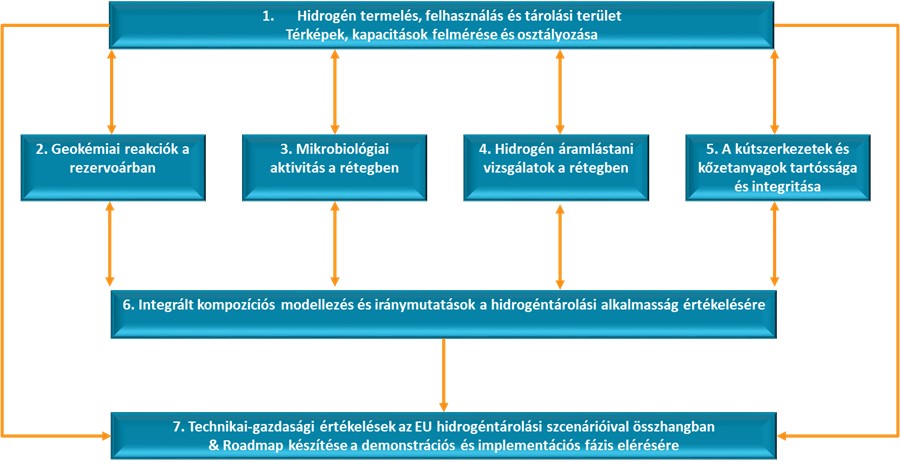HYUSPRE Project
Addressing the challenges of hydrogen storage in porous rock has also been
raised at EU level through a restricted call for proposals launched by the Fuel
Cells and Hydrogen Joint Undertaking as the sponsor ("Sponsor"), to
which the Hungarian Gas Storage Limited Company ("Hungarian Gas Storage
Ltd." or “HGS" or "Company") was invited to join by the TNO
project office leading the consortium.
The Sponsor is a public-private partnership (PPP), involving the
European Commission, dedicated to promoting the research and development of
fuel cell and hydrogen technologies in Europe with a view to achieving carbon
neutrality. In total, 16 organisations joined the call for proposals launched
by the Sponsor: TNO project office (based in the Netherlands) leading the
consortium, 8 industrial participants (Centrica, EBN, NAFTA, RAG, Shell, SNAM,
EQUINOR, NEPTUNE) in addition to HGS, 4 research institutes (TNO, Energy
Institute Linz, Fondazione Bruno Kessler, FZ Jülich) and 3 academic
institutions (University of Edinburgh, Clausthal University, Wageningen
University).
Objectives:
In porous reservoirs:
o
to establish the methods to examine geochemical, microbiological and flow
processes caused by hydrogen,
o
to develop a methodology to determine the recoverability of hydrogen and
the extent of hydrogen loss,
o
to investigate the potential reservoir deterioration and gas well
integrity.
o
To estimate the cost of hydrogen storage conversion and to identify
potential business opportunities.
o
To identify underground gas storage sites where long-term hydrogen and
hydrogen-enriched natural gas storage projects are feasible on a demonstration
basis, including access to external EU funding.
o
As a result of the R&D project, to upgrade TLR level 3 (technology
under laboratory conditions) to TLR level 5 (validation of hydrogen storage in
porous rock under industrial conditions).
Implementation
The research programme will be implemented in 7 working groups,
concurrently, each tasked with the following specific responsibilities:
- Study of hydrogen
production, use and storage in the case of industrial actors
- Exploring geochemical
reactions in the reservoir
- Microbiological
activity in the reservoir
- Carrying out hydrogen
flow studies in the reservoir
- Investigation of the
durability and integrity of well structures and (cap and reservoir) rock.
- Integrated composition
modelling based on the above to assess suitability for hydrogen storage
- Techno-economic assessment and preparing a roadmap

Expected Results
o
Complementing the Aquamarine Project to cover our underground storage
processes
o
Establishing an international hydrogen benchmarking system
o
Further EU and national funding may be involved through the established cooperation
o
Playing a leading role in the development of both national and EU hydrogen
strategies, and spearheading the launch of demonstration and R&D projects
for the long term
o
Long-term R&D cooperation
o
access to international laboratories
o
building a new hydrocarbon field assessment framework,
o
enhancing professional expertise by integrating innovative technologies
o
innovative energy system modelling techniques
The findings could significantly advance the exploration of hydrogen
storage potentials within HGS-operated storage facilities. In this context, it
is significant that the project organically complements the HGS-led Aquamarine
Project, since the latter focuses on assessing and readying the Hungarian
natural gas infrastructure for the hydrogen integration, whereas this project
concentrates on preparing the storage reservoirs for the same purpose.
